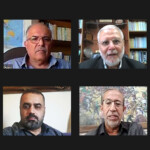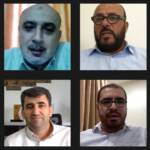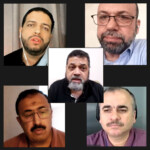Al-Zaytouna Centre for Studies and Consultations held, on 10/8/2022, a panel discussion entitled “The Israeli Aggression on Gaza Strip and Its Aftermath” with the participation of a group of researchers and experts specialized in Palestinian affairs.
Al-Zaytouna General Manager Prof. Dr. Mohsen Mohammad Saleh made his opening remarks, stating that the objective of this panel discussion is to conduct a situation assessment of the recent Israeli aggression on Gaza Strip (GS), evaluate the performance of the resistance and draw lessons to come up with constructive and useful recommendations for improving resistance work and developing appropriate strategies.
The first intervention was made by renowned futures studies expert Prof. Dr. Walid ‘Abd al-Hay, who emphasized his keenness and concerns about the resistance rather than the desire to criticize or offend it. ‘Abd al-Hay asserted that, earlier this year, he expected an Israeli aggression on GS based on studies and analyses published by Israeli think tanks and positions of Israeli leaders. He cautioned that his analysis of the political discourse of the leadership that faced the aggression showed that it has put exaggerated conditions for concluding the truce and it included high-pitched threats as if it was improvised rather than planned, which created a state of confusion among observers.
‘Abd al-Hay said that Hamas’s decision not to participate militarily in the fighting was a right decision, as Israel missed the opportunity to drag Hamas into a wide war whose timing and scenarios were controlled by Israel itself. This is while noting that although the did not impede the Palestinian Islamic Jihad (PIJ) in the battle. ‘Abd al-Hay explained that since Hamas took power in GS, there have been six confrontations, and it is noticeable that the interval between these wars is diminishing battle after battle, hence, we will face a new battle in two years.
‘Abd al-Hay asserted that, throughout the battle, the Israeli side sought to widen the rift between Hamas and PIJ regarding the timing and nature of the confrontation, and according to available data, the chances of Israel’s success reached 30 percent. He added that Israel is trying to focus on this aspect to establish the separation between the two movements in the coming period, through provocations, taking advantage of international and regional developments as well as the upcoming US congressional elections.
In his intervention, PIJ leader Haitham Abu Ghizlan stressed that Israel was unable to create a gap between Hamas and PIJ despite its media and political efforts. This failure was confirmed by the statements of PIJ Secretary-General Ziad Nakhaleh who was keen on highlighting Hamas’s role as an incubator of the resistance. Abu Ghizlan reiterated the importance of communication between Nakhaleh and the head of Hamas political bureau, Isma‘il Haniyyah, and the arrangements for holding bilateral meetings to draw lessons and plan for the next stage.
He pointed out that the PIJ did not rush into responding to the aggression, rather it was keen to consult and coordinate with the Joint Operations Room of the resistance in GS, and that six hours had passed before it responded.
‘Atef al-Joulani, writer, researcher and editor-in-chief of Assabeel website, stated that the Israeli objectives in this war were to achieve electoral gains, regain the initiative on the ground and adjust the balance of power, particularly since there was a state of deterrence established by the Battle of the Sword of Jerusalem. It also sought to strike the slogan of “unity of the fields” and punish PIJ for its resistance in the West Bank (WB).
Al-Joulani considered it necessary for the resistance factions to review declared slogans and goals, some of which seem difficult to achieve at this stage. These prompt Israel to focus on them, displaying the resistance as impotent, thus putting the latter under great pressure, especially in front of its public. He stressed the importance of coordinating between the factions, concerning the stances and reactions, the need not to exaggerate the terms for ending the confrontation, the need to seize the initiative in the upcoming confrontations, the importance of not being lured by Israel’s provocations and the need to avoid attrition. Al-Joulani also reiterated the importance of caution in dealing with the Arab sides and their promises, as they move according to their interests and the interests of the enemy in some cases. He expected that, in the coming period, Israeli will intensify its propaganda campaign to market the achievement, strengthen deterrence and split the ranks of the resistance factions.
Important interventions were presented by Ahmad ‘Abdul Hadi, Ziad Ibhais, Ahmad ‘Atawneh, Muhammad al-Jamal, Jamal ‘Issa, ‘Adnan Abu ‘Amer, Sari ‘Orabi, Ayman Zaidan, Wael al-Mabhouh and Usama Hamdan.
The interventions confirmed the following observations and recommendations:
• Warning against Israel seizing the initiative and managing the battle not only in Gaza, but also in WB, including Jerusalem.
• There was an Israeli interest in reducing the duration of this confrontation for fear of Hamas’s participation in it.
• The assessment of any upcoming battle must be in accordance with the resistance’s strategy, agenda, feasibility, timing and readiness.
• Establishing a committee or a unified political framework for the Palestinian resistance to develop a strategy to confront Israel. This requires a strategic dialogue among Hamas, PIJ and the rest of the resistance factions to form a vision for the upcoming confrontations with Israel.
• It is necessary to preserve the centrality of Jerusalem in the conflict with the occupation.
• It is essential to restore the element of initiative and preemptive strike, and preserve the element of surprise during the upcoming confrontations.
• The main Israeli objective in this battle was to undermine the achievements of the Battle of the Sword of Jerusalem, and there were mistakes on the Palestinian side that helped Israel to achieve that.
• The need to differentiate between the management of the conflict in GS and WB, where there are different factors and conditions. The conditions of the besieged GS do not allow it to engage in a military conflict on every occasion or event under the slogan of the “unity of fields.” The unity of fields means that every field is involved in the confrontation with Israel, while taking into consideration its own circumstances and available capabilities, while being supported by other fields.
• What is required is a frank and honest assessment of the resistance current conditions in GS and WB, defining its tools, management, influence and capabilities away from exaggeration and unrealistic rhetoric.
• Focusing on new and innovative resistance fields and means in WB and the 1948 occupied territories, and not limiting the resistance to military confrontations from GS.
Al-Zaytouna Centre for Studies and Consultations, 15/8/2022







Leave A Comment